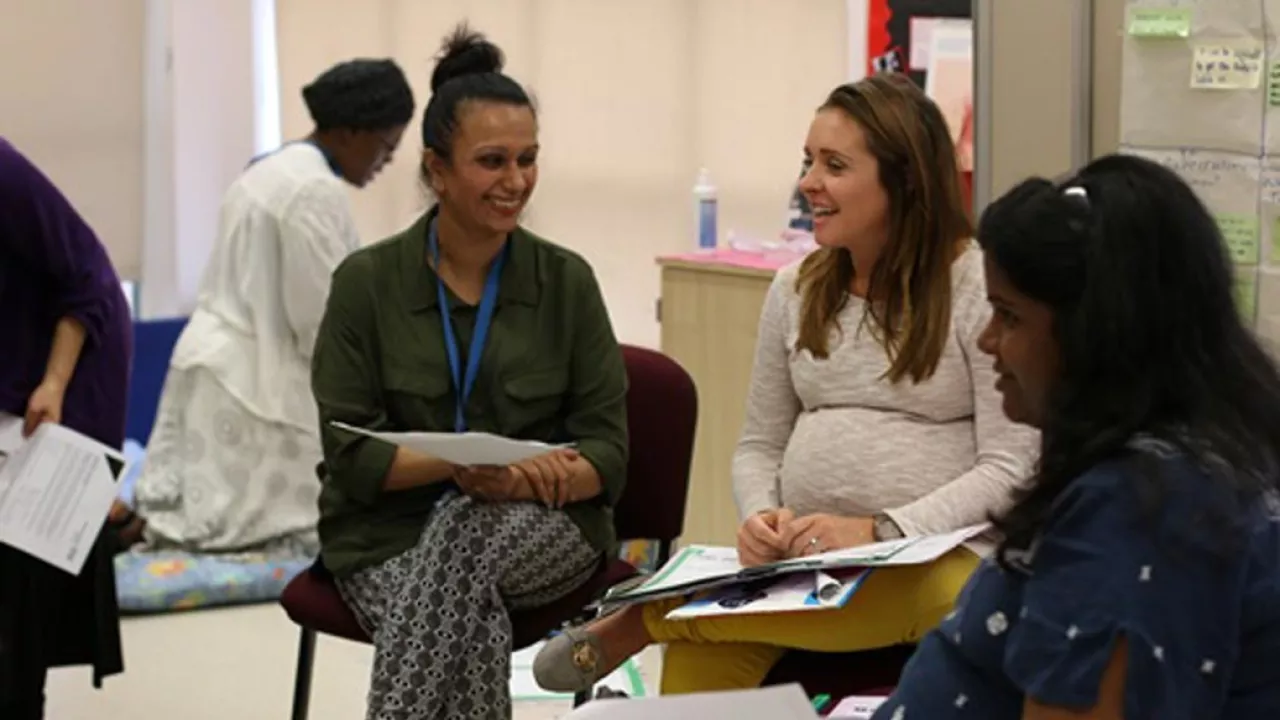UEL Pregnancy Circles trial on BBC World Service
UEL Pregnancy Circles trial on BBC World Service
Published
20 February 2020
Share
The trial of a group model of antenatal care called Pregnancy Circles, led by the University of East London (UEL)and Barts Health NHS Trust, has been featured on BBC World Service's Health Check.
Previous research has found that particular groups, such as those on lower incomes or from Black, Asian and Minority Ethnic (BAME) groups, experience worse pregnancy outcomes, including late access and poor experience of care, premature births and lower birth weights.
Preliminary research from the University of East London's Institute for Health and Human Development (IHHD) investigated ways in which these outcomes might be improved for women in East London. Group antenatal care was identified as a promising model by the researchers, midwives, commissioners and women themselves.
In the UK, women usually have several individual appointments with a midwife, but in a Pregnancy Circle, based on an idea from the US, several women attend antenatal sessions together to support each other through pregnancy, with the help of two midwives.
BBC reporter Bobbie Lakhera, who was six months pregnant and availing of standard care, attended a Pregnancy Circle at the Whittington Hospital in North London.
The trial, funded by the National Institute of Health Research as part of the REACH Pregnancy Programme, aimed to result in healthier babies and mothers, particularly for BAME groups and those living with social disadvantage such as those on lower incomes.
The Pregnancy Circles model first brings women together when they're about four months pregnant. During each two-hour session led by two midwives, the women receive their official pregnancy paperwork and flu and whooping cough vaccinations if they want them, and the usual antenatal checks, including listening to the baby's heartbeat.
The women engage in group discussions on keeping healthy during pregnancy and learn how to do some of their own health checks such as blood pressure monitoring.
Midwife Marie Walker explained in the report that women share experiences with each other and obtain relevant information and advice from one of the midwives about different aspects of pregnancy and birth, while individually the other midwife conducts their antenatal check which includes checking the uterus, checking the woman's abdomen, and listening to the foetal heart.
For me to do of all that, I'll need four different appointments with different people, so the benefits seem clear: Pregnancy Circles save time and money,"
Bobby Lakhera, BBC reporter on Pregnancy Circles, said.
She continued, "I'm often in a waiting room full of other pregnant women, but there's no chance to get chatting. So many changes happen to your body during pregnancy, and it would be lovely to be in a group with people at the same stage as me to talk things over with."
Professor Angela Harden, the trial Chief Investigator, from the IHHD at the University of East London, said the trial is hoping to achieve "healthier babies, including babies being born at the right time and at the right weight, so they're not a low birth weight, which puts them at greater risk of both immediate problems and later down the line.
"We think there are several mechanisms by which outcomes for both babies and women can be achieved, one of those is about seeing the same midwife throughout their pregnancy. Another factor is having group care so that women can learn from each other. Also, they develop a social network, which takes them through their pregnancy but also beyond birth as well."
Postnatal depression is one of the outcomes that will be measured in the trial. Professor Harden said, "We think the Pregnancy Circles will work to prevent postnatal depression, as well as providing better outcomes for the babies themselves,"
As midwife Teresa Jones explained, Pregnancy Circles are not only beneficial for the women, but the midwives too.
"Although the essentials are still there, the barriers are taken away, that feels freer; seeing the different ladies and helping them as much as I possibly can. We have the backup of the doctors and the team, if we need them at any point."
According to Jones, the most significant benefit for women attending is their mental wellbeing. "Often, they come with anxieties and fears, but once they've been discussed, they have a safe area to check in with each other and realise that everyone is feeling the same way. It's a useful way of giving each other support through a conversation and helping them adapt to pregnancy.
Reporter Bobbie Lakhera concluded, "The women I met had a clear bond, despite being from different age groups and backgrounds. They ask questions without being self-conscious, were supportive of each other, and they keep in touch outside of the Circle."
The trial is led by the University of East London and Barts Health in collaboration with three other universities - Queen Mary University of London, UCL, and City, University of London - and 12 NHS Trusts including the Whittington hospital. Results are expected in late 2021.
Share
Communications team
Contact us for press and interview requests
